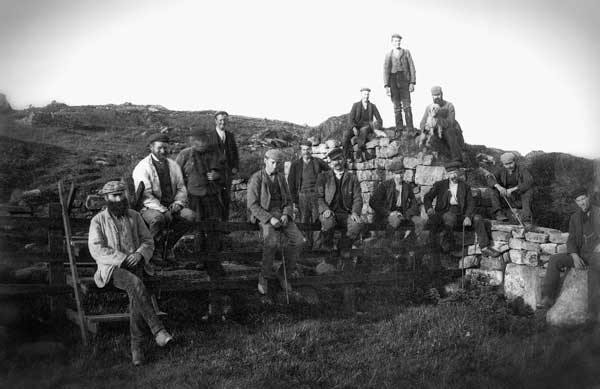We are all archaeologists now, working on what is left of the past ...
I admit to being a serial collaborator. But this is not just a personal inclination.
I am convinced that a major future for the Humanities in the Academy is in collaborative projects.
Because we learn from others. And the whole can often be more than the sum of the parts.

"Men of the Wall" - Hadrian's Wall, Northumberland - 1905
In archaeology the matter of collaboration is a fundamental issue in the politics of the past. Is the archaeologist, as expert authority, the steward or custodian of a community's history? What of a community's stakeholder interest in their own past? How might they be involved in a collaborative production of their own past? This is the focus of a project run through Metamedia - my lab at Stanford - Co-creating cultural heritage, funded by the Wallenberg Foundation. See also the research group at Stanford - Heritage and ethics.
To this end I have put much into two labs at Stanford. Laboratoria - places where things are made, experimentally, in teams, taking risks that effort may be wasted on intellectual dead ends, but also tapping the powers and emergent features of joint effort. Collaboratories - embracing the latest in new media that might aid the project. Studios - combining arts and sciences. Practice as research - making to learn. Metamedia, my lab at Stanford has organized and hosted more than 30 projects involving nearly 600 people over the last 5 years.
I have gathered together the experience we have gained so far in running and managing collaborative projects here - Collaboration - notes on a colloquium at Stanford Humanities Center February 2007. I have included practical tips as well as broader points of disciplinary politics.
A note on citation and collaboration in the Arts and Humanities
Team work in the Sciences is the norm. Multi-authored scientific papers are the norm. In the Humanities and Arts I am regularly asked of team projects - just what did so-and-so actually do? The norm is to assign credit to individuals. This is a major obstacle to encouraging collaborative work, because collaborative research does not attract the same kind of recognition in an academic career as the monograph and single authored paper.
I do not think the problem lies solely with appointments and promotions committees refusing to grant tenure on the basis of jointly authored papers. I think it is about a broader issue of trust - how do you know that this particular person in a particular team was not a freeloader/fellow traveler?
I suggest that a way to address this legitimate concern is to center collaborative work in the Arts and Humanities on labs and studios. Precsiely to associate collaboration with continuity and community - and reputation.
An established Lab has a history independent of its members. A track record will establish a reputation that facilitates trust in the collaborative success of the lab - that people there genuinely work together. So when a new joint publication is produced, it will be far easier to associate indvidual effort and talent with that of the group - individual scholarship gaining credit from its location within a discipline that is precisely identified with its peer practitioners and community.
Turn Humanities Labs and Art Studios into communities
see also -
Artereality - with Jeffrey Schnapp
Collaboration and research networks in the Humanities - with Nicole Coleman
Digital media, agile design and the politics of archaeological authorship
